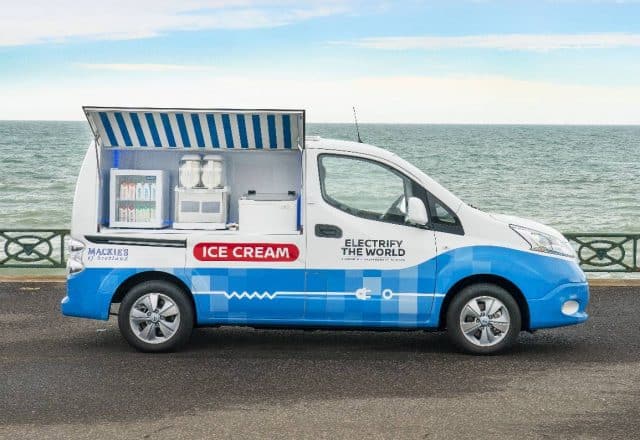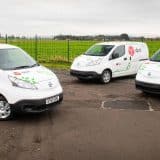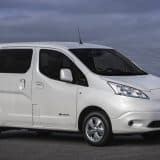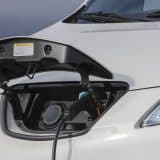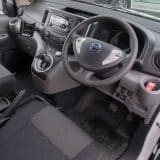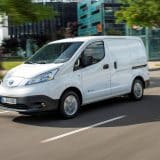Pros:
- Electric range
- Price
Cons:
- Just one body style
- Two seats
The Nissan e-NV200 has been around for a while now, it started life in 2013, and a revamp has made it more attractive. For vans in this segment, there’s not a wide range of alternatives but the e-NV200 offers just enough to be attractive with smart looks, lots of technology and decent range.
With growing numbers of businesses and the self-employed looking at switching to an electric van, which will best meet their needs? There’s no doubt the Nissan e-NV200 is a great choice, and it has picked up lots of awards. It’s based on the Nissan Leaf with an all-electric range of 187 miles. It’s a nice van to drive but there are only two seats in the cabin and just one body style. Essentially, it’s a great way to promote a business’s green credentials and it’s a well-built offering.
NISSAN SAYS
The Nissan e-NV200’s 40kWh battery means owners never have to spend money on expensive diesel or petrol while its service, maintenance and repair bills are appreciably lower than those of vans with traditional internal combustion engines.
Compact, versatile and fully equipped with Nissan Intelligent Mobility technology, the e-NV200 is the enterprising choice for businesses of all shapes and sizes.
Peter McDonald, fleet director at Nissan, said: “We’re extremely proud of the 100% electric e-NV200, which is available in van and both five- and seven-seat combi forms. It is smooth, practical and incredibly efficient, and with its maximum range of 187 miles in city conditions, it gets drivers and their cargos all around the city like true professionals.”
He added: “The Nissan e-NV200 is the ideal electric commercial vehicle for any business, whether you’re a fleet manager or a small enterprise. And when you go 100%, low operating costs, high efficiency and surprising performance come as standard.”
Reasons to buy
For those driving in cities and who want an electric van that delivers a cost-effective alternative to diesel power and low daily running costs, then the Nissan e-NV200 is for you. It’s better suited to city environments and makes for a good alternative to diesel-powered small vans. The running gear has been tried and tested with the Leaf and, unusually, comes with three charging connections to make recharging easier. The equipment list for the entry level e-NV200 Visia trim is a basic but decent offering, the Acenta offers more kit and rapid charging, but the Tekna adds satnav and alloy wheels to be a stylish and comfortable van to drive.
If you like the Nissan e-NV200, then consider the Renault Kangoo-e or the Citroen e-Berlingo.
Running Costs
Not only is the Nissan e-NV200 one of the best priced battery-powered vans in its segment, but its running costs make it a sound choice.
The van comes with a 40kW battery offering an all-electric range of 187 miles which should meet the daily needs of most firms.
Sign up for a cheap off-peak electricity deal and charging the battery will be cheaper plus the van is exempt from road tax currently. Drivers also get to drive in low-emissions zones for free.
The only downside is that the charge time from a wall box is 7.5 hours, but there is a rapid charging facility that will recharge the battery to 80% of its capacity in 45 minutes.
Servicing and maintenance costs are also lower since there are fewer moving parts.
Load Space
The Nissan e-NV200 offers 4.2 m³ of load space, one of the best in the segment. Another positive is that the dimensions make it more urban friendly, particularly for those on multi-drop rounds.
The load space will take two Euro pallets and the space between the rear wheel arches is 1.22 metres. The height of the cargo area is 1.36 metres.
The van’s payload is a useful 705kg – though carrying the full payload will reduce the all-electric range.
There’s also a floor protector fitted as standard, and there’s the option of adding extra protection to the doors and walls of the cargo area.
Also fitted as standard is a steel bulkhead and the load space is accessed using twin sliding side doors. There’s also the option of a mesh bulkhead that can fold down to enable longer items to be carried.
For those who need more load space, the Nissan e-NV200 XL offers 8m³ of load space, though this is a conversion carried out by another firm.
Technology & Safety
The Nissan e-NV200 is a van that is aimed squarely at the small van market, and it ticks a lot of boxes, and there’s a decent equipment list too.
While the entry-level model is basic for equipment, the Acenta offers cruise control, a colour reversing camera, automatic air-conditioning and a rapid charging port. It also has a battery heater and cooler, to deal with the prevailing weather conditions, a speed limiter and electrically adjustable door mirrors.
Get the e-NV200 Tekna and drivers enjoy satnav, automatic wipers and headlights, plus there’s a decent list of options including a ‘Glazing Pack’ that adds an integrated window to the steel bulkhead and a heating pack for the mirrors, steering wheel and front seats.
Performance
With the Nissan e-NV200, the driver gets a good view of the road, and even when fully laden this is a good vantage for drivers. The batteries are set low which helps with agility and cornering and progress is swift – the noise is near silence in the cabin.
The 80kWh battery produces 170bhp so acceleration is fairly swift – the sprint time from 0 to 62 mph is 14 seconds but it is quick from a standing start.
And while e-NV200 is based on the popular Nissan Leaf, it’s a shame that the carmaker’s latest semi-autonomous driving technology, ProPilot, is not an option – lots of firms would enjoy this facility.
With the zero emissions, the Nissan e-NV200 is a perfunctory van rather than one that will set new records – but it’s not intended to be anything other than what it does really well.


